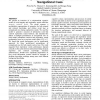16 search results - page 2 / 4 » Modeling Imitational Behavior Via Social Comparison Theory |
IAT
2010
IEEE
13 years 3 months ago
2010
IEEE
Group modeling is still an open challenge problem in pedestrian crowd simulations. Most existing work is based on socio-psychological models which can only describe the dynamics o...
KDD
2009
ACM
13 years 10 months ago
2009
ACM
This paper aims at discovering community structure in rich media social networks, through analysis of time-varying, multi-relational data. Community structure represents the laten...
IUI
2010
ACM
14 years 2 months ago
2010
ACM
We present an extension of a computational cognitive model of social tagging and exploratory search called the semantic imitation model. The model assumes a probabilistic represen...
SOUPS
2009
ACM
13 years 11 months ago
2009
ACM
Social navigation is a promising approach for supporting privacy and security management. By aggregating and presenting the choices made by others, social navigation systems can p...
ECAI
2006
Springer
13 years 9 months ago
2006
Springer
Abstract. Computational Game Theory is a way to study and evaluate behaviors using game theory models, via agent-based computer simulations. One of the most known example of this a...

